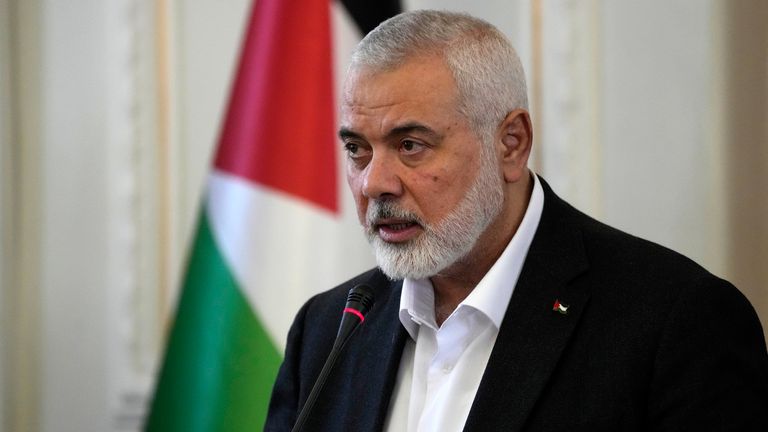Hamas leader Ismail Haniyeh killed in Iran, group says
Iran's Revolutionary Guards said Ismail Haniyeh and one of his bodyguards were "assassinated" in the capital Tehran, Iranian state media reported.
Wednesday 31 July 2024 15:14, UK
Hamas's top political leader Ismail Haniyeh has been killed in Iran, the group has confirmed.
Iran's Revolutionary Guards said Haniyeh and one of his bodyguards were "assassinated" in the capital Tehran at around 2am local time, Iranian state media reported.
Follow live updates on Israel-Hamas war
In a statement, Hamas said he was killed in "a treacherous Zionist raid on his residence in Tehran".
The assassination is a "cowardly act that will not go unpunished", Hamas-run Al-Aqsa TV cited senior Hamas official Moussa Abu Marzouk as saying.
Haniyeh was in Iran to attend the swearing-in ceremony for the country's new president, Masoud Pezeshkian.
The Revolutionary Guards said the cause of his death was under investigation and would be announced soon.
Hamas later said Haniyeh was killed in an airstrike and blamed Israel.
Haniyeh left the Gaza Strip in 2019 and had lived in exile in Qatar since then.
No one immediately claimed responsibility for the death, but Israel had vowed to kill Haniyeh and other leaders of Hamas after the group attacked Israel on 7 October, killing 1,200 people and taking 250 others hostage.
Analysis: Why this is such a major blow to Hamas
More than 39,360 Palestinians have since been killed and more than 90,900 injured since the war began, according to the Hamas-run health ministry in Gaza, which does not differentiate between civilians and combatants.
Earlier this year an Israeli airstrike killed three of Haniyeh's sons in an attack on high-profile targets in Gaza, with the Israeli military saying two were Hamas military operatives and the third was a cell commander.
Read more from Sky News:
Two killed in Ireland helicopter crash
Harris has clear run at Democrat nomination
It comes after the Israeli military claimed to have killed a senior commander of Lebanese militant group Hezbollah in Beirut.
The Israel Defence Forces (IDF) said it targeted Fuad Shukr - who served as the right-hand man to Hezbollah's secretary general Hassan Nasrallah - though the head of Hezbollah's operations centre claimed Shukr survived the attack but was critically injured.
The group later said they were still searching for the commander's body.
Be the first to get Breaking News
Install the Sky News app for free


The IDF claimed the senior commander was "responsible for the murder of the children in Majdal Shams" - in a reference to the rocket attack on a football pitch in the Israeli-occupied Golan Heights that killed a dozen young people on Saturday.
Haniyeh's assassination comes at a precarious time, as US President Joe Biden's administration has tried to push Hamas and Israel to agree to at least a temporary ceasefire and hostage release deal.



